
Unarguably, the climate has noticeably changed in recent years. Weather patterns are more erratic and less predictable. Along the eastern side of North America, this currently means less snow. But for other places, like Australia, the perilousness of the situation may result in swift corrective legislation. Despite any rhetoric or debate, the fact is that every hotelier needs to recognize that being a good corporate citizen means doing your part. At all costs, you want to avoid being labeled a violator of our planet’s ecosystem, especially when there are many simple yet visible steps that you can take to reduce both your carbon and plastic footprint. I’ve arranged the following checklist in order starting with those items that have the least cost or minimal disruption to your operations. Importantly, I am not advocating that you in any way ‘badge’ these activities as doing your share, as there is always more that we all can do. 1. As a very basic requirement, separate guestroom waste into trash and recyclable materials. Many properties I’ve visited still do not consider this worthwhile. 2. Importantly, if it is separated by the guest, it is a real faux pas to have your housekeepers combine the trash on their laundry carts. 3. If you have not already eliminated plastic straws, shame on you! While paper straws are less elegant and arguably a less efficacious substitute, the simple fact is that plastic straws are no longer acceptable. 4. Eliminate plastic drink swizzle sticks. There are alternates here made of bamboo and wood. Yes, they cost a little more. But you’ve gone through the process of eliminating plastic straws, so why would you not go that extra step? 5. Replacing plastic water bottles with glass or recyclable aluminum cans. The single use plastic bottle should be outlawed. But with manufacturers pumping out a million plastic water and soft drink bottles a minute – albeit with many producers now using a large share of recycled plastic in the process – recognize this as being more of a symbolic gesture because plastic is a visible and emotional enemy of environmental health. 6. Plastic laundry bags? I know they are not used by most guests, but while you’re expunging your property of plastic waste, consider a move to cotton bags or even paper. There’s a marketing opportunity here when the bags are attractive and reusable. 7. All other forms of plastic in the restaurant should also be on the chopping block. If you give out plastic cutlery or utilize plastic wrappers, there are alternatives available. Moreover, any made from Styrofoam needs to be looped into this conversation. 8. Single use plastic shampoo, conditioner and body gel bottles are clearly sending the wrong message. Many different dispenser systems are readily available, with the one-time dispenser expense easily offset by bulk amenity purchases. 9. A countertop liquid soap pump dispenser in guest washrooms is a way of reducing waste through the elimination of soap bars and their often-plastic wrappers. Again, there are some very alluring units that can be purchased. 10. In-room coffee Keurig and Nespresso both offer complementary recycling programs for their used coffee dispensers. Reach out and learn how to make this happen. 11. Smart thermostats that switch down heat and air conditioning when the room is not occupied can pay for themselves through effective power savings. 12. In Europe, it is not unusual to require guests to insert their key cards into a slot that activates the lights in their room. Not recommended for a retrofit due to cost, but if you’re planning a major renovation or added rooms, this should be considered. 13. Motion detectors that activate indoor garage lighting are logical, while using the same strategy for hallways is probably not a great approach! 14. If you have a courtesy corporate car, consider an electric vehicle, or at a minimum a hybrid. Although likely more expensive than any gas-guzzling counterpart, it’s the statement you are making that’s vital. 15. Make sure all of your air conditioning and refrigeration units operate on HFC-134a instead of freon which is known to damage the ozone layer. Or if you must, make sure that the freon is properly disposed. 16. Lastly, for those of you still operating any lighting that is not LED, it’s time to finally pull yourself out of the 20th century.
Create: Jan 26, 2020 Edit: Jan 26, 2020 International News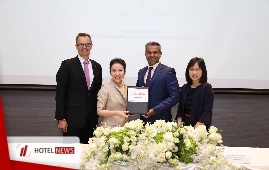
IHG signed a strategic partnership with long-standing partner Asset World Corporate (AWC), an integrated lifestyle real-estate group, to manage a portfolio of properties across Thailand. The agreement will see the development of more than 1,200 rooms across Thailand, with the first signing announced today as the 306-room InterContinental Chiang Mai Mae Ping. Serena Lim, Vice President, Development, IHG South East Asia and Korea commented, “With plans to double our portfolio in Thailand in the next 3-5 years, this signing today between IHG and AWC is another milestone in realising this ambition. Their reputation as a lifestyle and real-estate group, and long-standing relationship with IHG gives us great confidence of this growth momentum in Thailand.” Under the structure of the agreement, hotels in multiple popular destinations such as Chiang Mai, Bangkok and Hua Hin will be signed within three years. The first signing of the agreement announced today is the 306-room InterContinental Chiang Mai Mae Ping Hotel. Wallapa Traisorat, CEO and President of Asset World Corp Public Company Limited (AWC), said, “With our ambition to make Thailand a truly world-class tourism destination, we are excited to be extending our partnership with IHG, which is a testament to our unique business model of collaborating with an internationally renowned operator. With our shared vision of elevating the hospitality sector in Thailand and thus building a better future for the country’s economy, we are confident that the InterContinental Chiang Mai Mae Ping will be one of the many projects to set the benchmark in Thailand.” InterContinental Chiang Mai Mae Ping, a conversion of the prestigious Imperial Mae Ping Hotel, has long been in the forefront of Chiang Mai’s hospitality scene throughout its more than 30 years of operation. The hotel has held many high profile international events, as well as welcoming many prominent guests including royal family members, heads of state and celebrities from across the world. The hotel will portray the timeless and lavish beauty of the Lanna era with a modern luxury essence. As the world’s first international luxury travel hotel brand, InterContinental Hotels & Resorts has been pioneering new international destinations for decades. The brand sets itself apart by delivering world-class standards of sophistication through understated service and exceptional amenities. It is famed for its devotion to the comfort and wellbeing of guests through personalised and attentive services. IHG’s loyalty programme IHG® Rewards Club of more than 100 million enrolled members also provides access to a global following of travellers. The hotel is expected to open in 2021 and will continue its extension with full operations in 2022, and aims to set new hospitality benchmark in Chiang Mai. Located in downtown Chiangmai near the famous Chiang Mai Night Bazaar, Tha-Pae Gate, Warorot Market and other tourist attractions, InterContinental Chiang Mai Mae Ping will cater for both leisure and MICE travellers with its six food and beverage outlets, and over 3,600 sqm of outdoor and indoor convention, event and meeting spaces. Guests can also enjoy a holistic retreat at the Lanna Spa which focuses on balancing the body and mind with spa services accompanied by traditional and fusion Lanna cuisine. The Teresa Teng Museum, which is currently located on the 15th floor suite of the hotel to commemorate the famous Taiwanese singer and cultural icon will be conserved, with plans to convert it to a specialty restaurant and roof top bar, where guests can experience its original set-up, decor and furniture when Teresa Teng last stayed here over two decades ago. Thailand continues to be a strong growth market for IHG with 29 existing hotels across 6 brands in the portfolio, with another 30 hotels in the pipeline.
Create: Jan 26, 2020 Edit: Jan 26, 2020 International News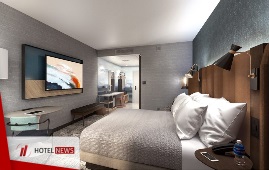
MCLEAN, Va. – Hilton (NYSE: HLT) today launches Tempo by Hilton, an approachable lifestyle brand curated to serve a growing segment of “modern achievers” who seek a hotel experience that reflects their ambition. By combining thoughtful design and diverse lifestyle partnerships, Tempo by Hilton provides hotel owners and developers with a highly scalable brand that is both uplifting and within reach for future guests – all powered by an efficient service model. “For more than 100 years, Hilton has pioneered the hospitality industry as we know it,” said Christopher J. Nassetta, president & CEO, Hilton. “Tempo by Hilton is the latest example of our unique ability to anticipate what our guests are looking for and deliver unmatched value for customers and owners alike. We’re thrilled to welcome this new brand to our Hilton family and look forward to building on our legacy of innovation with Tempo by Hilton.” As part of its commitment to helping guests live better lives, Tempo by Hilton has established and built upon partnerships with leading experts across the well-being, food and beverage and other lifestyle spheres. The experts on board include Arianna Huffington’s renowned behavior change platform, Thrive Global and established culinary firm, Blau + Associates. These organizations bring a sense of discovery to the brand, while empowering guests to continue prioritizing well-being and personal growth even while traveling. “Tempo by Hilton introduces a new concept by combining all the benefits and efficiencies owners expect from a limited service model with an uplifting dose of inspiration,” said Phil Cordell, SVP and global head of new brand development, Hilton. “Utilizing a data-driven blueprint, we identified lifestyle offerings inside the guest rooms and throughout the property that push the entire sector to new heights. The end result is a compelling, yet approachable brand that enables owners to expand their portfolios in sought-after locations across the country as well as capture a new demographic of travelers.” Guided by its various lifestyle partnerships, as well as exhaustive market research surveying more than 10,000 consumers, each Tempo by Hilton property will feature elements designed to help ambitious guests continue their journey without disrupting their routine. These signature elements include: Reinvigorating and Relaxing Guest Rooms: More than rooms, Tempo by Hilton accommodations serve as a refuge where modern travelers are reinvigorated for the day ahead. In-room experiences include the one-of-a-kind Power Up and Power Down collections; curated assortments of morning and bedtime rituals created in partnership with Thrive Global; as well as other unexpected touches, such as a finely tuned sleep environment and a dedicated Get Ready Zone with space to get ready, organize for the day and focus on work. In addition, the oversized bath suite, which includes mirrors with built-in Bluetooth speakers, is spacious, bright and invigorating to help guests recharge and renew. Shared Spaces and Amenities Designed to Inspire: Envisioned as catalysts for genuine, memorable experiences, all Tempo by Hilton public areas and amenities bring a fresh approach to industry mainstays. These include art and design collections specifically chosen to encourage guests to look up from their daily grind and take a moment for themselves. Guests will also enjoy state-of-the-art fitness offerings; flexible meeting spaces, which can be easily reserved by guests on the go; as well as more informal areas perfect for collaborating with teammates or concentrating on individual tasks. Culinary Journeys: Developed alongside the award-winning Blau + Associates, Tempo by Hilton’s food and beverage offerings ensure guests have access to everything they need to sustain energy and boost focus. The in-lobby Fuel Bar, a complimentary coffee and tea bar, offers a hand-selected assortment of premium coffees and teas, along with various benefit-driven mix-ins. Additional hearty and healthy options, including artisanal smoothies and other breakfast favorites, are available at the casual cafe. At the bar, spirited and non-spirited craft cocktails and small plates round out the concept’s culinary program. Additionally, Blau + Associates will collaborate with Hilton to form a Chef Collective, an advisory board of young up-and-coming chefs who will help curate seasonal menus. Sustainability: Tempo by Hilton aligns with Hilton’s Travel with Purpose 2030 Goals to double its investment in social impact and cut its environmental footprint in half. To that end, this new brand is committed to implementing sustainable practices throughout the guest experience. Examples of specific initiatives include LightStay, food waste programs, responsible seafood sourcing, hydration stations throughout the property to replace single-use plastic bottles and full-size bath amenity dispensers to reduce disposable plastics. “Through our research, we found that while our current upscale offerings have been incredibly successful at earning loyalty among specific guest segments, there was a rising demographic of ambitious and highly discerning travelers that weren’t engaging with the category,” said Jon Witter, chief customer officer, Hilton. “With Tempo by Hilton, we are able to reach these influential consumers through a new, elevated yet approachable class of hotels designed to surpass expectations of both customers and owners in truly meaningful ways.” Conceived with extensive input from leading hotel owners and investors around the country, the new brand has seen strong momentum ahead of its unveiling. There are more than 30 individual commitments to date with properties confirmed in several prime markets across the US, including New York, Maui, Boston, Los Angeles, Lexington, Nashville, San Diego, Charlotte, Washington D.C., Houston, Atlanta, and more. An additional 30 deals are in various stages of development. All guests will enjoy the benefits of Hilton Honors, Hilton’s award-winning guest loyalty program for the company’s distinct portfolio of brands. Members who book directly with Hilton have access to instant benefits, including a flexible payment slider that allows members to choose nearly any combination of points and money to book a stay, exclusive member discounts, free standard Wi-Fi and the Hilton Honors mobile app.
Create: Jan 18, 2020 Edit: Jan 18, 2020 International News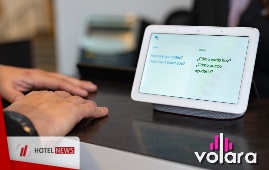
Voice on command is not just for the guestroom; Hoteliers are finding the Google Assistant’s interpreter mode + Volara to easily and accurately streamline guest communication Research suggests that customer-experience (CX) technologies that serve every touchpoint, add personalization and drive satisfaction were at the top of operators’ wish lists for 2020. To be effective and deliver a rapid return on investment, these solutions must successfully delight guests, increase operational efficiencies, inspire loyalty, and generate profits. One technology that is checking all these boxes – yet is often overlooked – is digital voice translation. Considering that 55% of households are expected to own smart speaker devices by 2022 and 50% of all online searches will be voice-based by 2020, demand for hyper-convenient voice interactions while traveling is on the rise. Powering rooms with voice controls is gaining momentum (30% of hoteliers say they plan to bring voice controls to the guestroom in the coming year), but hoteliers need to expand their voice strategies beyond those four walls to drive customer satisfaction, loyalty and revenues – especially if the hotel or brand is favored by international travelers. Global Travel Growth Sparks Demand for Voice Translation Amadeus commissioned a study to explore the trends shaping the future of travel. What it found was that Asia – home to about 4.46 billion people speaking nearly 2,300 languages – will account for almost 22% of global arrivals by 2020 (up from 18% in 2008) and the region’s residents will represent 32% of travel spending by 2020. To compete for a share of these travel dollars, hoteliers will need to communicate with these visitors who are fluent in Chinese, Hindi, English, Russian, Indonesian and Japanese. Furthermore, Europe is expected to produce 400 million more outbound travelers in 2020 than in prior years, most of whom will be speaking Russian, German, French, English, Turkish, Italian, Spanish, Ukrainian, Polish and Dutch. To help people better connect and get help, the Google Assistant introduced a featured called interpreter mode that translates conversations in real time. Provisioned and managed by Volara, named the ‘Best Voice Activated Tech Product of 2020’ by HotelTechReport last week, the technology is now being rolled out to hotels that will enable staff to communicate with global guests easily – and in their native language. The new voice translation technology is improving the quality of interactions between hotel staff and guests, resulting in better communications and high-value service. Google Assistant’s Interpreter Mode can translate 29 languages in real time, including: Arabic, Chinese (Mandarin and Cantonese), Czech, Danish, Dutch, English, Finnish, French, German, Greek, Hindi, Hungarian, Indonesian, Italian, Japanese, Korean, Polish, Portuguese, Romanian, Russian, Slovak, Spanish, Swedish, Thai, Turkish, Ukrainian and Vietnamese. With Volara’s support, hotels can receive a Google Nest Hub to place at their front desk or Concierge station. When a guest needing translation assistance approaches, the staff simply says “Hey, Google, be my Spanish interpreter.” Then, the interpreter mode will show text on the screen that translates their words as they speak and repeat the message in English. This technology will enable international travelers to receive voice-automated professional hospitality in real time when they travel. The Google Assistant’s Interpreter Mode + Volara Places Hyper-Focus on Staff While this translation technology is driving hyper-convenient interactions with guests, it is also enabling hoteliers to elevate their staff. According to the 2019 Customer Engagement Technology Study, 42% of hoteliers will be investing in staff-facing technologies in 2020 to enhance the customer experience. Happy employees mean happy guests, and happy guests spend more money. By giving hotel staff tools that will make it easier for them to do their jobs, it will ultimately increase guest satisfaction and drive revenues. Perhaps that’s why 27% of hoteliers say they plan to add guest-facing self-service technology next year, and 24% are looking for technologies that automate service – both of which can be accomplished by the Google Assistant interpreter mode. When looking at the key to unlocking ROI from customer experience technology, 2019 CET Study authors Daniel Connolly, Dean of the College of Business & Public Administration at Drake University, and Jungsun (Sunny) Kim, Associate Professor at the William F. Harrah College of Hospitality, UNLV, had this to say: “To remain relevant and competitive, hospitality leaders must be agile enough to adapt to shifting consumer demands and have a willingness to take calculated risks into uncharted territory if they are to stand out and capture new market share.” Digital voice translation technology may be uncharted territory to some, but those agile hotels and brands who are embracing it are finding it to be the missing link for improving guest engagement.
Create: Jan 18, 2020 Edit: Jan 18, 2020 International News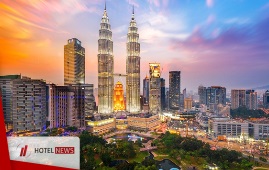
Hyatt Regency branded hotel in Kuala Lumpur, set to be completed in 2024, the new hotel will mark the return of the Hyatt Regency brand to Kuala Lumpur. For leisure and business travelers visiting the Malaysian capital, Hyatt Regency Kuala Lumpur will deliver energizing experiences and a stress-free environment that embodies the Hyatt Regency brand ethos. Guests will enjoy seamless, intuitive service alongside refreshing food and beverage concepts and flexible spaces suited for work, collaboration or relaxation. “We are excited to be working with KL MIDTOWN Sdn. Bhd. on the development of Hyatt Regency Kuala Lumpur and to be bringing the Hyatt Regency brand back to the energetic capital city of Malaysia,” said David Udell, group president, Asia Pacific, Hyatt. “This will be our second collaboration with Hap Seng in Malaysia after we recently announced our plans for the Hyatt Centric Kota Kinabalu. We are grateful for Hap Seng’s continued trust and are delighted to be part of these very exciting milestones and new experiences in Malaysia.” Hyatt Regency Kuala Lumpur will be a state-of-the-art property designed by internationally renowned architect Kengo Kuma. When completed, the hotel will offer four food and beverage concepts including two bars, a market café, and a Japanese restaurant. It will also feature an outdoor swimming pool, a fully equipped fitness center, and Regency Club – an exclusive lounge offering a relaxed environment to work, meet and socialize for club level guests. For meetings and events, the hotel will also include 21,528 square feet (2,000 square meters) of flexible space, including a 10,764 square foot (1,000 square meter) ballroom, making it the ideal setting for any occasion. The hotel will be situated just north of the Malaysia International Trade and Exhibition Centre (MITEC), the third largest MICE venue in Southeast Asia and the largest trade and exhibition center in Malaysia. With a direct connection to MITEC, Hyatt Regency Kuala Lumpur will be easily accessible for business travelers who are visiting the meeting venue. The venue is located just five miles (eight kilometers) northwest of Kuala Lumpur’s city center, and 37 miles (60 kilometers) from Kuala Lumpur International Airport. “In addition to being a prominent hotel for us in Malaysia, the introduction of Hyatt Regency Kuala Lumpur will bring awareness to the Hyatt Regency brand in the wider region,” said Patrick Finn, senior vice president – real estate & development, Asia-Pacific for Hyatt. “The new hotel is part of our strategy to grow Hyatt’s brand presence in Malaysia, building upon the five hotels that currently operate in the region.” “Hyatt Regency Kuala Lumpur will add to Hap Seng’s hotel development efforts with Hyatt in Malaysia, complementing the recently announced Hyatt Centric Kota Kinabalu,” said Dato’ Jorgen Bornhoft, chairman of Hap Seng Consolidated Berhad. “We chose Hyatt for this project because of our excellent past experience working together, paired with the hotel company’s established leadership reputation in the hospitality industry. We will work closely with Hyatt and Kengo Kuma to create a standout Hyatt Regency property that reflects all the elements that has made the brand a preferred choice for both business and leisure travelers over the years.”
Create: Jan 18, 2020 Edit: Jan 18, 2020 International News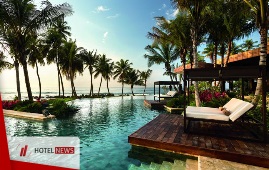
Dorado Beach, a Ritz-Carlton Reserve officially reopens, marking an exciting chapter in the property’s rich legacy as well as in the recovery and resurgence of Puerto Rico. Following a meticulous restoration, Dorado Beach emerges more spectacular than ever, featuring expanded offerings, amenities and facilities, allowing the celebrated resort to continue to create transformative and personal journeys for all guests. As a part of Marriott International, Dorado Beach, a Ritz-Carlton Reserve has partnered with musical artist and philanthropist Lin-Manual Miranda to support his work in stimulating the Puerto Rican economy and preserving the country’s culture by strengthening and sustaining the local arts community. Throughout the resort’s opening season, starting now through February 2019, Dorado Beach will donate $10 per room to Miranda’s Flamboyan Arts Fund, which supports all aspects of Puerto Rico’s artistic community, including music, theater, visual arts, dance, literature, and youth arts education – critical components of Puerto Rico’s tourism industry and pivotal to the economic recovery of the island. “Dorado Beach exemplifies the unique qualities of the Reserve brand, which is distinguished for its collection of locally-inspired properties that offer heartfelt care and transformative experiences in the most incredible corners of the world,” said Lisa Holladay, Global Brand Leader for Ritz-Carlton Reserve. “With this reopening, the world’s most discerning travelers can once again immerse themselves in the local culture, enjoy unique experiences set apart by human connection and discover this rare estate anew while also supporting the revitalization of Puerto Rico.” Guests returning to Dorado Beach will find each of the property’s 114 beachfront guestrooms and suites re-imagined with a thoughtful design and refreshed with a color palette that amplifies the natural beauty just beyond their doors. The expansive and lush landscape that makes up this special, rare estate has welcomed the addition of more than 300,000 new plant species, resulting in a truly tropical sensory experience. “It is with great enthusiasm and joy that we welcome guests back to our treasured Reserve. The dedication, hard work and care that our Ladies and Gentlemen have invested in the transformation of Dorado Beach is truly remarkable and we look forward to sharing it with both returning and new guests,” said George Sotelo, General Manager of Dorado Beach, a Ritz-Carlton Reserve. “We are delighted to continue to curate extraordinary experiences for our guests through new and meaningful journeys, as well as by encouraging them to rediscover the intrinsic beauty of Dorado Beach.” Encanto Beach Club Bar & Grill will introduce a refreshed dinner menu featuring coastal cuisine that highlights authentic dishes from the Mediterranean. The property’s chic beachside restaurant, Positivo Sandbar, will debut an Omakase & Ceviche bar situated directly on the sand for relaxed, oceanside dining. Dorado Beach’s highly-anticipated new signature restaurant and bar, COA, will be revealed in mid-December 2018. The award-winning Spa Botánico has been fully revitalized for guests to unwind in serenity and comfort. In addition to the return of its signature and locally-inspired spa treatments and unique handcrafted products that are made in the on-site apothecary, Spa Botánico will also debut new treatments as well as introduce a spa cuisine concept. Su Casa, Dorado Beach’s unique five-bedroom villa and former home of historical figure Clara Livingston, will welcome guests starting mid-December 2018 after completing a renovation that will fully modernize the space while maintaining its historical significance and personality.
Create: Jan 18, 2020 Edit: Jan 18, 2020 International News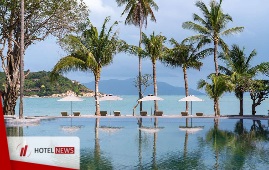
Meliá Hotels International and Asset World Corporation (AWC), Thailand's leading integrated lifestyle real estate group celebrated the grand opening of Meliá Koh Samui, a stunning nautical-themed luxury beachfront resort in Koh Samui. The soul-stirring coastal haven, which combines a modern essence with the charming maritime heritage of Koh Samui, marks the first hotel under the Meliá Hotels & Resorts brand to open in Thailand. This opening of Meliá Koh Samui is the start of a strategic roll-out of the Meliá brand in Thailand and at least two more hotels will be opened in key destinations across Thailand, including INNSiDE by Meliá Bangkok Sukhumvit and a hotel in Chiang Mai in partnership with AWC. Nestled on Choeng Mon Beach, just 15 minutes from Samui International Airport, Meliá Koh Samui is a 159-room and 41-suite property that features a host of outstanding facilities, including two restaurants, an executive lounge, a stylish beach club and a swim-up bar, plus the YHI Spa, a fitness center and, for families, a kids' club, outdoor playground and a mini water park. Event planners can take advantage of extensive conference facilities of 7 multi-functional rooms including a room with unique beach front view, a ballroom that can accommodate up to 200 guests and an outdoor pool-side and beachfront function spaces which recently hosted a gala dinner for 500 guests. With its stunning seafront setting and exceptional amenities ideal for leisure and MICE travelers, Meliá Koh Samui will become one of the leading and most sought-after resorts on Koh Samui's north coast, a world-class tourism destination with outstanding facilities for all sectors of the market. Guests can also unwind in two outdoor swimming pools, including a large lagoon pool that loops like a river through the resort's lush tropical gardens. Many of the ground-floor Pool Access rooms and suites allow guests to slide directly into the embrace of cooling pool water from their private terrace. The Deluxe and Premium Rooms are ideal for couples, while the spacious Family Rooms feature a master bedroom for parents and in-room games for the kids. Guests seeking extra space and exclusive services can select the resort's suites that offer access to the executive lounge. The Level Boat Suites are truly unique, inspired by traditional Thai vessels and paying homage to Koh Samui's historic position as a safe haven for sailors and sea traders. This nautical design theme has been woven into the DNA of the resort, including the Level Lounge, which is shaped like a boat's hull. Embodying AWC's firm belief in “building a better future", and Meliá Hotels International's efforts to improve lives in disadvantaged communities across Thailand, Melia Koh Samui also houses the Gallery, a not-for-profit social enterprise of art and design gift shops under the aegis of the Asset World Foundation for Charity , which embraces socially responsible practices to contribute to society and communities. The shop will give customers the opportunity to be part of supporting the local communities with all profits contributing to further artistic endeavors, as well as preserving and promoting local culture and areas in need. Meliá Hotels International has been recently acknowledged as the Most Sustainable Hotel Company worldwide, by the SAM's Corporate Sustainability Assessment and sustainability is what the group wishes for from the beginning. “We are thrilled to partner with Meliá Hotels International and to introduce the Meliá Hotels & Resorts brand to Thailand for the first time. With its stunning seafront setting Meliá Koh Samui aims to offer a truly unique experience. As the hotel boasts the first lagoon pool and the largest swimming pool in Koh Samui, along with a creative combination of hydro therapy facilities like jacuzzi, water massage and rooms with a direct pool access, guests will find themselves relishing in the soothing fascination of water features. The hotel also offers a unique experience for guests who will be able to stay in suites fashioned after boats. These unique settings will enable them to enjoy a fun-filled and peaceful vacation in a serene atmosphere," said Khun Wallapa Traisorat, Meliá Koh Samui's owner, CEO and President of AWC. “This landmark project will mark the start of a strategic roll-out of the Meliá brand in Thailand, in line with AWC's growth-led strategy. Together, we aim to build a better future for Thailand's hospitality landscape and economy , and partnering with Meliá will allow us to set a new benchmark for Thai hospitality and drive global demand." “Today is a ground-breaking moment for Meliá Hotels International, as we celebrate our first hotel opening in Thailand – an extraordinary country and a strategic market for a leading global resort brand like ours. After more than 30 years of successful operations in Asia, we signed a strategic framework agreement with Asset World Corporation, we believe this first opening of Meliá Koh Samui is the beginning of our expansion in Thailand, bringing our dream of establishing and growing in this country alongside a major local partner to fruition; a partner that understands, and shares, our strong service and hospitality philosophy, a fundamental factor for ensuring the quality, reputation, and sustainability that we wish for Meliá Koh Samui," commented Mr. Gabriel Escarrer, Executive Vice Chairman and CEO of Meliá Hotels International at the opening ceremony. Beyond Thailand, Meliá Hotels International is expanding throughout Asia Pacific and has a total of 51 properties across the region, which are expected to open in the next few years.
Create: Jan 18, 2020 Edit: Jan 18, 2020 International News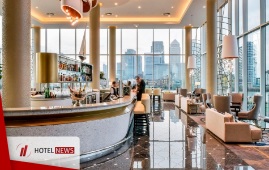
The IHG Owners Association, which represents IHG® franchise hotel owners worldwide, announced that Wayne West III has assumed chairmanship of its Global Board of Directors for 2020. West is President and Partner of Newport Hospitality Group, based in Williamsburg, Va., and brings an extensive background as a hotelier and operator. With more than 40 years in the industry, he has helped hotels maximize guest loyalty and team engagement while ensuring exceptional revenue performance and profitability. He succeeds 2019 chair Kurt Furlong, Chief Revenue Officer and Partner with Genuine Hospitality, LLC. Newport is a hotel management company that operates more than 50 select, full-service and independent hotels under various brands, primarily on the Eastern Seaboard. West joined the company in 2013 as Chief Operating Officer and quickly advanced to his current position as President. Previously, he was with Lane Hospitality (now Spire Hospitality) for 12 years, serving as Chief Operating Officer for the last three. West has also held executive positions with several other leading hospitality compa-nies. "I’ve been proud to serve on the IHG Owners Association Global Board for the past year as Treasurer, and I’ve enjoyed my leadership responsibilities as Vice Chair and then Chair of the Americas Regional Council (ARC),” says West. “I am very hon-ored to now assume the role of Chair of the Association. I look forward to representing the interests of our members around the world and connecting with IHG leadership on their behalf.” West has been an active member of the Association for many years having served as Chair of the Holiday Inn Committee and several other Association working groups, including the Strategic Planning and Standards Committees and the Holiday Inn Food & Beverage Council. Don Berg, CEO of the IHG Owners Association, notes, “Wayne’s deep, first-hand knowledge and experience in all areas of hotel operation will certainly benefit the work of the Association on many levels. His profound hotel management acumen will provide authentic and intelligent thought leadership to our members.” West attended East Carolina University and earned his Certified Hotel Administrator designation from the American Hotel & Lodging Association. He resides with his wife, Marianne, in a small lakeside town in North Carolina. The IHG Owners Association is also pleased to announce its 2020 Global Board of Directors: Chair-Elect & Americas Member at Large: Norman Leslie, President and Founder, National Hospitality Services Treasurer & Americas Member at Large: Navroz Saju, President and CEO, HDG Hotels Secretary & Americas Member at Large: Nellie Dhanji, Vice President of Operations and Legal Counsel, Stanley Park Investments, Ltd. Immediate Past Chair Advisor: Kurt Furlong, Chief Revenue Officer and Partner, Genuine Hospitality, LLC Past Chair Council Representative: Kerry Ranson, Chief Development Officer, HP Hotels CEO, IHG Owners Association: Don Berg Europe Regional Representative: Maurice Jansen, COO, EVENT Hotels Middle East/Africa/Asia Regional Representative: Paul Salter, Managing Director, Salter Brothers Asset Manage-ment and CEO and Managing Director, Salter Brothers Hotel Group Americas Regional Representative: Mark Zipperer, President and CEO, Pride Hospitality, LLC Americas Member at Large: Asad Malik, President and CEO, Amerilodge Group Americas Member at Large: Euan McGlashan, Co-Founder and CEO, Valor Hospitality Partners Americas Member at Large: Perry Molubhoy, Founder, President and CEO, Atlantic Hotels Americas Member at Large: Juan Carlos Santos, CEO, BPO Americas Member at Large: Felix Seiler, COO, Holloway Lodging Corporation Americas Member at Large: David Wespiser, Founding Partner, Hotel Development Services, LLC Europe Member at Large: John Stuart, COO, RBH Hospitality Management IHG Representative: Elie Maalouf, CEO, IHG Americas
Create: Jan 18, 2020 Edit: Jan 18, 2020 International News
Frontline Employee Recruitment and Selection Technique 1 Design Creative Job Announcements; In order to draw a strong applicant pool for open posi- tions, the position announcements must be well-crafted. The hotel’s marketing department should either write or help edit such descriptions. Without sacrificing truth in advertising, creative-minded marketers can often produce more interest- ing and appealing announcements than those who are more operations-minded. Technique 2 Foster Relationships with Educational Institutions; Often, the best line-level associates and entry-level manag- ers can be drawn from trade schools, colleges, and universities that offer hospitality management programs. All hotels (even free-standing, independent hotels) should have active relation- ships with one or more hospitality educational institutions. Technique 3 Participate in Career Events; A representative from the hotel’s management team should speak at local high school career days. Not only does this exposure foster positive community relations, but also the students are a good source of potential employees for certain positions. Technique 4 Encourage Employee Referrals; Line-level associates should be encouraged to recruit their friends for open positions. Because the line-level employee is knowledgeable about the hotel’s working culture and also knows his/her friends, this combination of knowledge puts him/her in an informed position to assess the potential match. Technique 5 Utilize 360-Degree Interviewing; Utilize 360-degree interviewing in which a candidate is interviewed not only by who s/he will be reporting to, but also by peers and potential subordinates. While this approach mandates interview training, there are several benefits. Namely, when a candidate is interviewed by future subordi- nates, his/her emotional intelligence, and rapport-building skills can be assessed. The 360-degree interviewing also gives those involved a sense of buy-in and engenders an empower- ment culture. Technique 6 Use Panel-Style Interviewing; Front-of-the-house position candidates should be sub- jected to the panel-style interviewing in which they are interviewed by more than one person at once. Panel-style interviewing allows for the ability to test a candidate’s confi- dence and conversational ability in a situation in which some would find intimidating. For the purpose of practicality, a panel interviewing approach can be combined with the 360 degree interviewing described in the previous technique. Technique 7 Encourage Multiple-Day Interviewing; Whenever possible, applicants for the line-level positions should be asked to return for interviews on more than one day in order to gauge their dependability and demeanor at various points in time. Technique 8 Assess Applicant Conversational Ability; During interviews, front-of-the-house applicants should be asked questions that test their conversational abilities. One such question might include ‘If an alien lands on earth, how would you describe to the alien how to make a peanut butter and jelly sandwich?’ Technique 9 Assess Applicant Creativity; During interviews, front-of-the-house applicants should be asked to complete tasks that assess their creative talents. For instance, they could be given four minutes to write all of the uses that can be thought of for an object (e.g., a blanket) and then given four more minutes to write all of the uses that can be thought of for a different object (e.g., a brick). This task is termed a divergence test, and responses can be rated based upon the following criteria : 1- F luency—how many meaningful ideas are generated in response to the stimuli? 2- O riginality—how rare are the given responses? 3- E laboration—how much detail is contained in the responses? Technique 10 Assess Applicant Team-Mentality; During interviews, front-of-the-house applicants should be asked to tell a story about a time when they delivered exceptional customer service experience either at a hotel or any other service business. Candidates who recount stories in which they worked with past coworkers to deliver the experi- ence are likely more team-oriented than those who only discuss their own actions . Technique 11 Assess Applicant Problem Solving Skills; During interviews, a technique should be used to gauge the problem-solving skills of frontline associates. One such technique entails showing the candidate a container filled with small items, such as paperclips, and asking how s/he would go about estimating the number of items in the con- tainer (without opening it). Technique 12 Assess Applicant Innovativeness; On the application form for college students to intern at the hotel, ask the internship applicants to write a paragraph detailing a creative solution to a problem. For example: “Please describe one innovative solution to reducing guests’ perceived waiting times at check-in.” Technique 13 Incorporate a Walk-Through During an Interview; As part of the interview process, walk the applicant around the job area and observe how s/he interacts with the employ- ees as well as the guests. These observations provide a glimpse into the likely tone of interactions they will have if hired. In addition, when you let him/her see the work area and tasks, s/he may decide this is not a good fit or might become more excited about the prospect of working there. Technique 14 Incorporate a Slideshow During an Interview; When interviewing a job candidate, if the interviewer is pleased with the performance of the candidate, the inter- viewer should complete the meeting by showing the can- didate a slideshow on his/her laptop. The slideshow should include pictures of team members and pictures of them interacting. While viewing the pictures, stories can be shared regarding how the team members have been developed to be key players. Technique 15 Reinforce Reputation During an Interview; When interviewing a job candidate, if the interviewer is pleased with the performance of the candidate, the inter- viewer should make a point of telling the applicant about some of the accolades won by the hotel, the brand, and/or the man- agement company.
Create: Jan 18, 2020 Edit: Mar 7, 2020 Hotel Management
UK hoteliers face a tough year in 2020 with a growth in rooms supply increasing competition and dampening revenues, despite underlying demand remaining strong. ‘Hotels in the UK provinces found 2019 challenging and there seems to be little opportunity to improve this performance in 2020,’ commented HVS London chairman Russell Kett. ‘The pipeline of new hotel openings will continue to add further pressure to many hotels which have experienced a decline in occupancy and average rates, sometimes both. Once the current pipeline has worked its way through and post-Brexit demand levels have picked up, positive growth should be seen as we move into 2021 and 2022,’ he added. Demand for hotel rooms in London remained at a strong level throughout 2019 and hotels are likely to see a continuation of this, notwithstanding the growth in supply, especially at the luxury end of the market, which may lead to a softening of hotel occupancy levels. ‘Average rates in London should continue to grow, however, so overall RevPAR [rooms revenue per available room] is likely to remain flat throughout the year,’ added Kett. HVS has identified five key themes likely to impact the sector moving forward into the new decade – the need for a personalised offer; the importance of developing a relationship with the guest; the issue of corporate responsibility; attracting and retaining good staff; and the need to maximise profitability. Whether a hotel will get a particular guest’s business now depends on whether it will provide an appropriate experience beyond the minimum expectation of a comfortable bed, decent shower, fast efficient Wi-Fi and good value for money,’ said Kett. ‘Gen X and Gen Y travellers seek a more personal offer – an experience to remember that they can’t get elsewhere.’ Furthermore, hotels and hotel companies can no longer rely on loyalty schemes to build a relationship with guests as many no longer care about incentives such as free stays, especially when they are restricted from redeeming them. Hoteliers need to find a way to develop a meaningful relationship with customers to enhance their loyalty. HVS’s third concern is that of sustainability and social responsibility, which is increasingly forming part of consumers’ – and investors’ – decisions. It’s now essential for hotel operators to have such policies and to communicate them effectively to the guest – paying lip service isn’t enough. Credible environmental policies are now an essential part of business life. Likewise, the ongoing importance of attracting and retaining staff through competitive packages, providing training and meaningful career development has never been more vital in the sector, particularly post Brexit. Making staff feel part of a ‘family’, providing a flexible working environment and profit-sharing are already starting to make a huge impact in some businesses and more needs to be done to make the sector more attractive to potential recruits who live in the UK as well as ensuring current vacancies can be filled. Lastly, hoteliers need to ensure that as many areas of their hotel as possible are income producing in order to deliver a proper return on investment. A minimum of 15%, but preferably 20% profitability should be sought from F&B operations, for example, with under-performing areas of a hotel developed to provide overnight guests and non-residents with a well-designed range of refreshment options that make money. Concluded Kett: ‘The world is changing fast and hoteliers need to adapt and incorporate these changes in a creative way in order to survive and prosper.’
Create: Jan 13, 2020 Edit: Jan 13, 2020 International News
The Saudi Commission for Tourism & National Heritage (SCTH) announced that visitors can now use existing UK, US, and Schengen area country visas to obtain Saudi Arabia visitor visas at airport arrivals regardless of their citizenship. Visitors intending to benefit from the new regulation must have previously used the visa to travel to any one of these countries before entering Saudi Arabia. The policy builds on the Kingdom's historic visa launch in September 2019. Currently, citizens from 49 countries are eligible to apply for an e-Visa online or get a Visa of arrival into Saudi Arabia. The tourist visa allows for a stay of up to 3 months per entry, with visitors able to spend 90 days a year in Saudi Arabia. The visa is valid for one year, with multiple entries. This is the latest step taken by Saudi Arabia to open its doors to tourists from different countries of the world.
Create: Jan 13, 2020 Edit: Jan 13, 2020 International News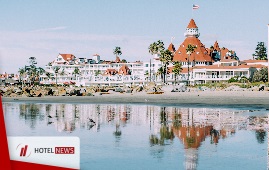
Eden Prairie (Minneapolis) MN, January 2020 … Bigger, bolder and now independent – Big Box Hotels are increasingly breaking off from major brands and deploying their expansive meeting spaces, extensive room inventory and outstanding technical services to become independent operators. It’s a growing trend that offers planners the advantages of a large hotel accommodating groups of up to 3,000 attendees while providing a level of flexibility and creativity once reserved for boutique properties and smaller brands. Teneo Hospitality Group, the leading group representation firm, is responding to this development by introducing its newest collection of member hotels – the Big Box Collection, which now includes 52 independent and smaller-branded member hotels across the United States, Europe and Dubai, United Arab Emirates. Eleven of these are offering special hot dates and incentives, available throughout 2020 and accommodating meetings in several prominent destinations including Boston, Chicago, Dallas, Honolulu, Orlando, Reno, San Diego and the Temecula Valley Wine Country in California. “This move from Big Box brands to independent status is a significant trend,” says Teneo President Mike Schugt. He notes that for the last 20-30 years, many boutique hotels have transitioned to independent or soft branded properties. This paved the way for many larger, branded properties to declare their independence and reap the benefits of autonomy. Big Box brands are able to provide far more options to planners and guests, unfettered by frequently inflexible policies of a large corporate brand. Often operating without a brand name, these newly independent hotels have embraced a creative, personalized culture based on the offering’s boutique hotels initiated 20 years ago. “We now see highly-customized, catering-to-all-your-senses experiences available to larger groups in the Big Box hotels we represent,” says Mike Schugt. Hoteliers are capitalizing on the new opportunities to bring in the best, most personalized aspects of the boutique concept – customized service that focus on issues important to guest satisfaction. These include sustainability, curated experiences, imaginative décor, music, scent, lighting, original art and architecture, raising the bar in food and beverage services – all without the cookie-cutter limitations that can be imposed by major brands. Planners should welcome this growing trend, according to Schaan Baker of Phillips Ultrasound. “The Big Box concept gives planners new options, sophisticated technical services, greater value and return on investment, a chance to explore new destinations, and the creative energy and resourcefulness of an independent or smaller brand property,” she notes. This creative, flexible approach lets hotels showcase the best of their destination. For example, the Boston Park Plaza, a Boston icon for nearly a century, has added a loft-like contemporary event space, Avenue 34, to its three magnificent ballrooms. In Hawaii, the new Alohini Resort, Waikiki Beach, offers a spectacular lobby Oceanarium and the Thrillist, an adventurous program of helicopter tours and horseback rides to plant legacy trees in Hawaii’s forests. At the Omni Dallas, planners can see their brand’s name in lights on the Dallas skyline, thanks to the mile of LED lights placed around the building. “By declaring their independence, many larger hotels are able to create their own, singular brands, free from rigid corporate policies and operating restrictions,” says Mike Schugt. He also notes that the trend toward autonomy dovetails perfectly with planners’ demand for more diverse meeting space, greater options in accommodations and the most sophisticated technology. At the same time, planners are calling for a less rigid, more open approach to the planning process. “Independent hotels are better able to provide a creative, workable and unique environment,” says Mike Schugt. He also sees this trend expanding and continuing for the foreseeable future. “Over 50 Big Box hotels have recently become independent,” Mike Schugt says. “We are proud that a significant number of them have become Teneo members, recognizing our commitment to promoting independent hotels and smaller brands.” Hotels in Teneo’s Big Box Collection, offering Hot Dates and Special Promotions throughout 2020, span historic landmarks, beachfront resorts, sophisticated urban hotels and major conference center hotels accommodating up to 3,000 attendees. -Alohini Resort, Waikiki Beach, Honolulu, Hawaii -Boston Park Plaza, Boston, Massachusetts -Caribe Royale, Orlando, Florida -Hotel del Coronado, San Diego, California -The Fairmont Chicago Millennium Park – Chicago, Illinois -The Fontainbleau, Miami, Florida -The Loews Meeting Complex at Universal Orlando, Orlando, Florida -The Omni Dallas, Dallas, Texas -The Pechanga Resort and Casino, Temecula, California -The Peppermill Resort Spa & Casino, Reno, Nevada -Rosen Hotels, Orlando, Florida
Create: Jan 11, 2020 Edit: Jan 11, 2020 International News
